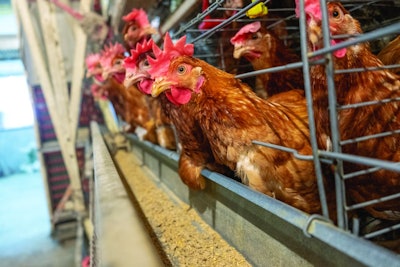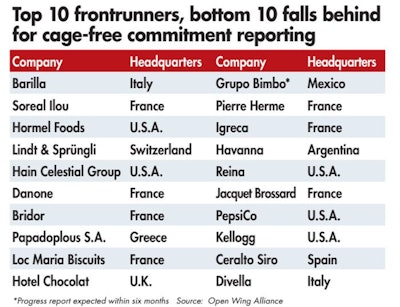
Over 2,400 companies, including 146 of the largest global corporations, have made cage-free egg commitments, according to the Open Wing Alliance.
In its latest report, The Global Manufacturers Report, the Alliance, founded by the Humane League and which seeks to bring an end to caged egg production, highlights 34 companies as "frontrunners," but alongside these it also points to 14 companies that it describes as "falling behind."
The report focuses on food manufacturers as, the alliance says, they have a huge influence on animal welfare and more than a third of cage-free commitments around the world have been made by this sector.
Food manufacturers may be less consumer facing than many other sectors, but they are still subject to consumer expectations for corporate accountability. Similarly, they are also subject to stakeholder expectations for corporate transparency about their social and environmental impacts and the welfare of animals in their supply chain.
Of the 34 companies that the alliance calls frontrunners, 16 in particular, it says, are leading the way, having already fulfilled their cage-free commitments. These companies are now exclusively sourcing cage-free eggs. They include Barilla, Lindt & Sprungli and Danone.

The importance of reporting
Many companies, the report continues, are reporting global progress on their commitments and are on track to fulfill on time. This reporting approach is now the industry standard, demonstrating that animal welfare is now an integral part of corporate social responsibility (CSR).
Not all companies, however, take the same approach in all of their operations. The Open Wing Alliance points to Grupo Bimbo as an example. Grupo Bimbo, the alliance says, is reporting progess in some of its reporting regions, while neglecting other parts of the world. Without comprehensive reporting, stakeholders cannot trust that companies are treating each global region equitably.
Unevenness in reporting is not the only issue highlighted by the alliance.
Those companies that it describes as laggard are not only neglecting to report on their cage free progress, but are also refusing to engage in dialogue regarding the status of the animal welfare commitment that they have already made. These companies need to step up and prioritize accountability if they are to be trusted to keep their promises, the alliance says, adding that it is calling on them to reveal their global cage-free status, to prove that when they make a commitment, they mean it.
Cage-free production globally
While ever more companies are making cage-free commitments, it is worth remembering that, globally, most birds are still raised in cages. Various sources suggest that approximately 84% of global egg production is from caged birds.
In China, for example, while interest in cage free eggs is growing, 90% of the national flock is thought to still be kept in cages.
Where steps have been taken to end use of conventional cages, different countries have done this in various ways.
Data published late last year by the U.S. Department of Agriculture reveals that in the U.S. close to 35% of the total table egg laying flock is now kept cage-free.
In the EU, perhaps surprisingly, almost 45% of laying hens are still kept in cages. While battery cages may have been illegal in the bloc since 2012, producers were given the option of keeping birds in enriched cages.
There have been numerous calls to also outlaw enriched cages, and they are gradually falling out of favor with European producers due to pressure from retailers. The EU is expected to ban all caged farming by 2027.
New Zealand, like the EU, has also banned battery cages, with their use coming to an end late last year, however, like the EU, New Zealand permits the use of enriched cages.
In neighboring Australia, caged eggs make up 40% of supermarket egg purchases in Australia, but battery cages will become illegal by 2036.
Canada has also chosen 2036 as the year by which it will no longer be possible to keep laying hens in barren cages, with the installation of new cages having become illegal in 2017. Producers are, however, permitted to use enriched cages. Figures from 2021 suggest that over half of Canada’s flock is kept in conventional cages.

















